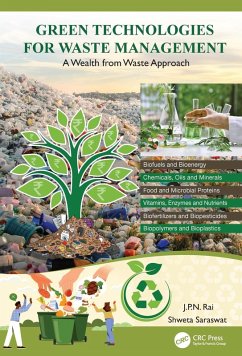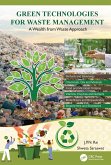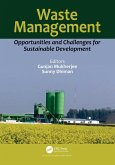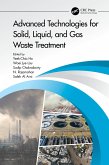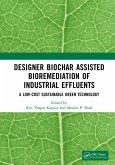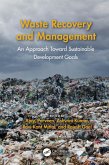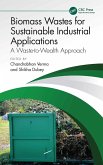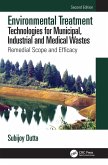J. P. N. Rai, Shweta Saraswat
Green Technologies for Waste Management (eBook, PDF)
A Wealth from Waste Approach
121,95 €
121,95 €
inkl. MwSt.
Sofort per Download lieferbar

61 °P sammeln
121,95 €
Als Download kaufen

121,95 €
inkl. MwSt.
Sofort per Download lieferbar

61 °P sammeln
Jetzt verschenken
Alle Infos zum eBook verschenken
121,95 €
inkl. MwSt.
Sofort per Download lieferbar
Alle Infos zum eBook verschenken

61 °P sammeln
J. P. N. Rai, Shweta Saraswat
Green Technologies for Waste Management (eBook, PDF)
A Wealth from Waste Approach
- Format: PDF
- Merkliste
- Auf die Merkliste
- Bewerten Bewerten
- Teilen
- Produkt teilen
- Produkterinnerung
- Produkterinnerung

Bitte loggen Sie sich zunächst in Ihr Kundenkonto ein oder registrieren Sie sich bei
bücher.de, um das eBook-Abo tolino select nutzen zu können.
Hier können Sie sich einloggen
Hier können Sie sich einloggen
Sie sind bereits eingeloggt. Klicken Sie auf 2. tolino select Abo, um fortzufahren.

Bitte loggen Sie sich zunächst in Ihr Kundenkonto ein oder registrieren Sie sich bei bücher.de, um das eBook-Abo tolino select nutzen zu können.
This book addresses various types of wastes, their generations, and the status of waste management in developed and developing countries. It discusses advanced green technologies used in harnessing energy and bioproducts from waste, highlighting how these innovative tools do not damage the environment but are rather an alternate source of energy.
- Geräte: PC
- mit Kopierschutz
- eBook Hilfe
Andere Kunden interessierten sich auch für
![Green Technologies for Waste Management (eBook, ePUB) Green Technologies for Waste Management (eBook, ePUB)]() J. P. N. RaiGreen Technologies for Waste Management (eBook, ePUB)121,95 €
J. P. N. RaiGreen Technologies for Waste Management (eBook, ePUB)121,95 €![Waste Management (eBook, PDF) Waste Management (eBook, PDF)]() Waste Management (eBook, PDF)68,95 €
Waste Management (eBook, PDF)68,95 €![Advanced Technologies for Solid, Liquid, and Gas Waste Treatment (eBook, PDF) Advanced Technologies for Solid, Liquid, and Gas Waste Treatment (eBook, PDF)]() Advanced Technologies for Solid, Liquid, and Gas Waste Treatment (eBook, PDF)51,95 €
Advanced Technologies for Solid, Liquid, and Gas Waste Treatment (eBook, PDF)51,95 €![Designer Biochar Assisted Bioremediation of Industrial Effluents (eBook, PDF) Designer Biochar Assisted Bioremediation of Industrial Effluents (eBook, PDF)]() Designer Biochar Assisted Bioremediation of Industrial Effluents (eBook, PDF)51,95 €
Designer Biochar Assisted Bioremediation of Industrial Effluents (eBook, PDF)51,95 €![Waste Recovery and Management (eBook, PDF) Waste Recovery and Management (eBook, PDF)]() Waste Recovery and Management (eBook, PDF)121,95 €
Waste Recovery and Management (eBook, PDF)121,95 €![Biomass Wastes for Sustainable Industrial Applications (eBook, PDF) Biomass Wastes for Sustainable Industrial Applications (eBook, PDF)]() Biomass Wastes for Sustainable Industrial Applications (eBook, PDF)54,95 €
Biomass Wastes for Sustainable Industrial Applications (eBook, PDF)54,95 €![Environmental Treatment Technologies for Municipal, Industrial and Medical Wastes (eBook, PDF) Environmental Treatment Technologies for Municipal, Industrial and Medical Wastes (eBook, PDF)]() Subijoy DuttaEnvironmental Treatment Technologies for Municipal, Industrial and Medical Wastes (eBook, PDF)50,95 €
Subijoy DuttaEnvironmental Treatment Technologies for Municipal, Industrial and Medical Wastes (eBook, PDF)50,95 €-
-
-
This book addresses various types of wastes, their generations, and the status of waste management in developed and developing countries. It discusses advanced green technologies used in harnessing energy and bioproducts from waste, highlighting how these innovative tools do not damage the environment but are rather an alternate source of energy.
Dieser Download kann aus rechtlichen Gründen nur mit Rechnungsadresse in A, B, BG, CY, CZ, D, DK, EW, E, FIN, F, GR, HR, H, IRL, I, LT, L, LR, M, NL, PL, P, R, S, SLO, SK ausgeliefert werden.
Produktdetails
- Produktdetails
- Verlag: Taylor & Francis eBooks
- Seitenzahl: 405
- Erscheinungstermin: 5. September 2023
- Englisch
- ISBN-13: 9781000933147
- Artikelnr.: 68381914
- Verlag: Taylor & Francis eBooks
- Seitenzahl: 405
- Erscheinungstermin: 5. September 2023
- Englisch
- ISBN-13: 9781000933147
- Artikelnr.: 68381914
- Herstellerkennzeichnung Die Herstellerinformationen sind derzeit nicht verfügbar.
J.P.N. Rai, PhD, is presently working as a full-time professor in the Department of Environmental Sciences, at G.B. Pant University of Agriculture and Technology, Pantnagar, Uttarakhand, India, and has been the Head of the Department for eight years. Dr. Rai has supervised more than 25 PhD theses and teaches postgraduate and PhD courses titled Biodegradation and Recycling of Wastes, Waste Treatment Design, and Environmental Waste Utilization. He has published two books along with more than 200 publications to his credit, including research papers, review articles, and chapters in scientific journals of national and international repute, apart from being a versatile reviewer of several journals. He has over 37 years of teaching and research experience in the field of environmental science, particularly in environmental biotechnology. He has successfully completed a dozen research projects in various fields of ecotechnology, bioenergy production, bioremediation of wastewater and terrestrial sites, as well as nanobiomaterial synthesis and their applications in addressing environmental issues. Currently, he is actively engaged in the research of environmental waste degradation and its utilization, wastewater treatment, and purification, employing a diverse nature of bioresources.
Shweta Saraswat, PhD, is an assistant professor in the Department of Environmental Sciences at G.B. Pant University of Agriculture and Technology, Pantnagar, Uttarakhand, India. She is also a former postdoctoral fellow in various projects funded by the Department of Science and Technology, Indian Council of Medical Research and Ministry of Environment, Forest and Climate Change, and the Government of India. She has 13 years of research and teaching experience to her credit. Her previously published works include a book, more than 15 research papers, including review articles and book chapters in reputed scientfic peer-reviewed journals in the field of bioremediation of terrestrial and aquatic systems, bioenergy production, green technology development for environmental waste reduction and their effective utilization. She is now working on integrating nanotechnology with bio-based systems for sensing, analyzing, and treating the contaminated wastewater in an ef¿cient and sustainable manner.
Shweta Saraswat, PhD, is an assistant professor in the Department of Environmental Sciences at G.B. Pant University of Agriculture and Technology, Pantnagar, Uttarakhand, India. She is also a former postdoctoral fellow in various projects funded by the Department of Science and Technology, Indian Council of Medical Research and Ministry of Environment, Forest and Climate Change, and the Government of India. She has 13 years of research and teaching experience to her credit. Her previously published works include a book, more than 15 research papers, including review articles and book chapters in reputed scientfic peer-reviewed journals in the field of bioremediation of terrestrial and aquatic systems, bioenergy production, green technology development for environmental waste reduction and their effective utilization. She is now working on integrating nanotechnology with bio-based systems for sensing, analyzing, and treating the contaminated wastewater in an ef¿cient and sustainable manner.
Part I: Environmental Wastes: Status, Prospects, and Management. 1. Waste:
Classi¿cation, Generation, and Status. 2. Waste as a Resource. 3. Life
Cycle Assessment of Waste Management Systems. Part II: Green Technologies
for Wealth Generation. 4. Bioremediation. 5. Biodegradation. 6. Biosorption
Technology. 7. Single-Cell Protein Technology. 8. Bioenergy Production
Technologies. 9. Nanobiotechnology: Concept and Scope for Wealth
Generation. 10. Hydrometallurgy and Biomining. 11. Constructed Wetlands and
Microcosm Technology. Part III: Holistic Approach for Waste Management and
Bioproducts Recovery. 12. Principles and Practices for Zero Waste Concept.
13. Technology Integration for Zero Waste Production. 14. Recovery of
Byproducts and Other Value-Added Products from Waste.
Classi¿cation, Generation, and Status. 2. Waste as a Resource. 3. Life
Cycle Assessment of Waste Management Systems. Part II: Green Technologies
for Wealth Generation. 4. Bioremediation. 5. Biodegradation. 6. Biosorption
Technology. 7. Single-Cell Protein Technology. 8. Bioenergy Production
Technologies. 9. Nanobiotechnology: Concept and Scope for Wealth
Generation. 10. Hydrometallurgy and Biomining. 11. Constructed Wetlands and
Microcosm Technology. Part III: Holistic Approach for Waste Management and
Bioproducts Recovery. 12. Principles and Practices for Zero Waste Concept.
13. Technology Integration for Zero Waste Production. 14. Recovery of
Byproducts and Other Value-Added Products from Waste.
Part I: Environmental Wastes: Status, Prospects, and Management. 1. Waste:
Classi¿cation, Generation, and Status. 2. Waste as a Resource. 3. Life
Cycle Assessment of Waste Management Systems. Part II: Green Technologies
for Wealth Generation. 4. Bioremediation. 5. Biodegradation. 6. Biosorption
Technology. 7. Single-Cell Protein Technology. 8. Bioenergy Production
Technologies. 9. Nanobiotechnology: Concept and Scope for Wealth
Generation. 10. Hydrometallurgy and Biomining. 11. Constructed Wetlands and
Microcosm Technology. Part III: Holistic Approach for Waste Management and
Bioproducts Recovery. 12. Principles and Practices for Zero Waste Concept.
13. Technology Integration for Zero Waste Production. 14. Recovery of
Byproducts and Other Value-Added Products from Waste.
Classi¿cation, Generation, and Status. 2. Waste as a Resource. 3. Life
Cycle Assessment of Waste Management Systems. Part II: Green Technologies
for Wealth Generation. 4. Bioremediation. 5. Biodegradation. 6. Biosorption
Technology. 7. Single-Cell Protein Technology. 8. Bioenergy Production
Technologies. 9. Nanobiotechnology: Concept and Scope for Wealth
Generation. 10. Hydrometallurgy and Biomining. 11. Constructed Wetlands and
Microcosm Technology. Part III: Holistic Approach for Waste Management and
Bioproducts Recovery. 12. Principles and Practices for Zero Waste Concept.
13. Technology Integration for Zero Waste Production. 14. Recovery of
Byproducts and Other Value-Added Products from Waste.
